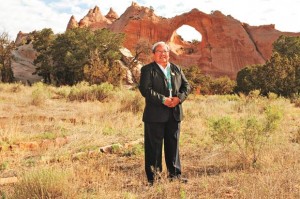WASHINGTON — Navajo lawmakers voted Thursday to reject a congressional plan to settle tribal water-right claims in the Little Colorado River basin, capping months of debate by the tribe.
The council voted 15-6 after a “fairly short debate” to oppose a bill that would provide almost $360 million in government funding for water projects in the Hopi and Navajo nations, in exchange for the tribes relinquishing further claims in the river basin.
Supporters of the bill criticized the council’s action as short-sighted and said that Navajo leaders are already talking about how they can get water to the people without the deal offered in Congress.
“We really hoped the council would have taken on a visionary role and seen the ramifications of not settling,” said Erny Zah, a spokesman for Navajo President Ben Shelly. “We’re not too confident that this is something that could be put on the table again.”
But tribal sentiment on the settlement has been “overwhelmingly against it,” said Jerome Clark, a spokesman for Navajo Speaker Johnny Naize, who scheduled Thursday’s special session on the issue. The council was merely reflecting the voice of the people, he said.
“After a while it was pretty obvious what the decision was going to be,” Clark said of Thursday’s voting session. “You could tell by the way each individual spoke.”
Thursday’s action by the Navajo follows two votes on the issue last month by Hopi lawmakers. The Hopi tribal council first voted to reject the plan, then voted less than a week later to accept a settlement but reject the specific legislation that had been introduced by Arizona Sens. Jon Kyl and John McCain.
Kyl has said that the bill will not move forward without the blessing of both the Hopi and Navajo tribes. Neither Kyl nor McCain could be reached to comment Thursday on the Navajo vote.
Leaders of both tribes have expressed support for the Senate legislation and a companion bill in the House. But in public hearings since Kyl introduced his bill in February, there has been stiff opposition from members of both tribes, said former Hopi Chairman Vernon Masayesva.
Along with the Little Colorado River settlement, Navajo leaders are actively negotiating other water settlements, but those settlements may have been hurt by this decision, Zah said.
“This lack of vision from our council will hinder those negotiations,” he said. “Our team that is negotiating will not have the full confidence they need.”
The council could have amended the bill, Zah said. It was within their scope to amend it, using the parts they liked and throwing out the parts they didn’t.
“It’s unfortunate, for whatever reason, the council didn’t see this as a good opportunity,” Zah said.
